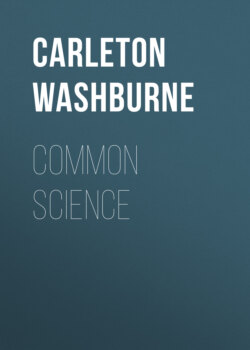Читать книгу Common Science - Carleton Washburne - Страница 37
На сайте Литреса книга снята с продажи.
Fig. 24. Hockey is a fast game because there is little friction between the skates and the ice.
ОглавлениеTable of Contents
But we can increase or decrease friction a great deal. If we make things rough, there is more friction between them than if they are smooth. If we press things tightly together, there is more friction than if they touch lightly. A nail in a loose hole comes out easily, but in a tight hole it sticks; the pressure has increased the friction. A motorman in starting a trolley car sometimes finds the track so smooth that the wheels whirl around without pushing the car forward; he pours some sand on the track to make it rougher, and the car starts. When you put on new shoes, they are so smooth on the bottom that they slip over the ground because of the lack of friction. If you scratch the soles, they are rougher and you no longer slip. If you try to pull a stake out of the ground, you have to squeeze it harder than the ground does or it will slip out of your hands instead of slipping out of the ground. When you apply a brake to an automobile, the brake must press tightly against the axle or wheel to cause enough friction to stop the automobile.
There are always two results of friction: heat and wear. Sometimes these effects of friction are helpful to us, and sometimes they are quite the opposite. The heat from friction is helpful when it makes it possible for us to light a fire, but it is far from helpful when it causes a hot box because of an ungreased wheel on a train or wagon, or burns your hands when you slide down a rope. The wear from friction is helpful when it makes it possible to sandpaper a table, scour a pan, scrub a floor, or erase a pencil mark; but we don't like it when it wears out automobile tires, all the parts of machinery, and our clothes.
Experiment 17. Hold a nail against a grindstone while you turn the stone. Notice both the wear and heat. Let the nail rest lightly on the stone part of the time and press hard part of the time. Which way does the nail get hotter? Which way does it wear off more quickly? Run it over a pane of glass and see if it gets as hot as it does on the grindstone; if it wears down as quickly.
Why we oil machinery. We can decrease friction by keeping objects from pressing tightly against each other, and by making their surfaces smooth. The most common way of making surfaces smooth is by oiling or greasing them. A film of oil or grease makes things so smooth and slippery that there is very little friction. That is why all kinds of machinery will run so smoothly if they are kept oiled. And since the oil decreases friction, it decreases the wear caused by friction. So well-oiled machines last much longer than machines that are not sufficiently oiled.
